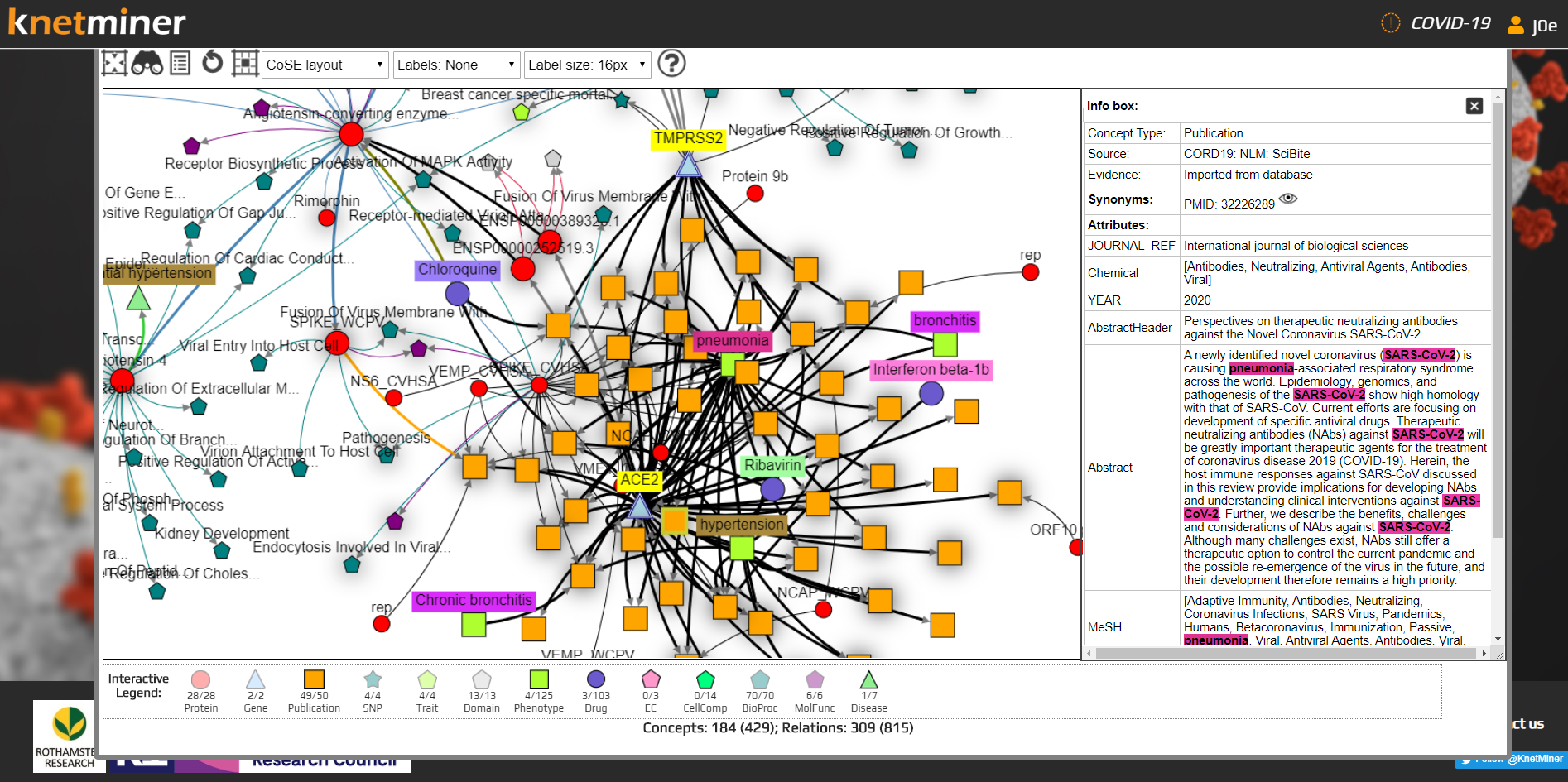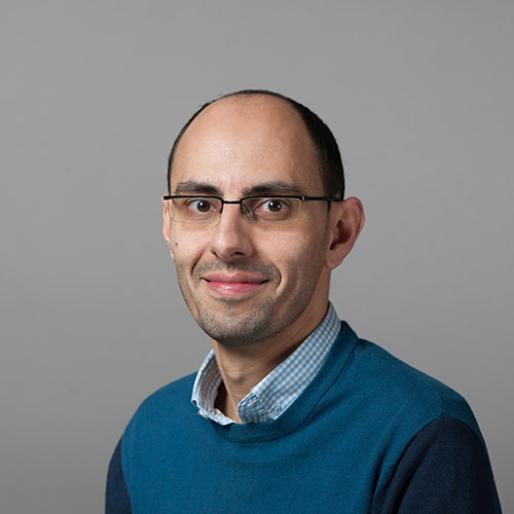The big picture: using wildflower strips for pest control
A group of researchers based at Rothamsted have responded to a request from the White House, Microsoft, Mark Zuckerberg and others to find a way to rapidly sift through the mountain of COVID-19 scientific data.
Taking time off from their own research, the Rothamsted team repurposed a tool they had originally developed to help crop scientists, to provide medical researchers with quick and intuitive access to all documented linkages between genes, medicines, and the virus.
A group of researchers based at @Rothamsted have responded to a request from the @WhiteHouse, @Microsoft, Mark Zuckerberg and others to find a way to rapidly sift through the mountain of COVID-19 scientific data.
Full story: https://t.co/C51HnGemyn pic.twitter.com/L4u1UNYila— Rothamsted Research (@Rothamsted) May 7, 2020
By bringing together COVID-19 related data in one place, the hope is that this will speed up the international search for useful drugs, stop researchers repeating work done elsewhere, avoid harmful interventions, and ultimately, help pave the way to a vaccine.
A US Government-backed call had urged the world’s artificial intelligence experts to develop new text and data mining techniques that could help the science community answer urgent questions related to the deadly outbreak.
Project leader, Dr Keywan Hassani-Pak, originally developed the KnetMiner software to support scientists studying complex plant traits and diseases – but together with his team, quickly realized the potential of it to help aid coronavirus research.
“Using KnetMiner, medical researchers can now search for genes and keywords, visualize connections between biological concepts and explore knowledge relating to the new coronavirus and COVID-19 disease.
“Users can search for drugs related to coronavirus and explore the surrounding connected data. Alternatively, they can investigate what pathways the drugs affect and visualize if any negative downstream effects may be present with using the drug in certain diseased populations.
"The genetic component of how SARS-CoV-2 and the human body interact can also be explored.”
The software links together almost 170,000 scientific articles, the majority with detailed information about human genes, plus SARS and COVID-19 related proteins, drugs and other medical conditions.
This works out at more than 1.6 million relationships between biological entities – something that would take years of searching for, using conventional means.
“We have connected the dots in the COVID-19 biomedical data and put the information in a machine-readable format and in context with human genetics, pathogen-host, and drug-target interaction data,” said Dr Hassani-Pak.
It was mid-March when The White House Office of Science and Technology Policy launched the COVID-19 call to action.
Over 500 scientists, software developers and clinicians joined forces in the COVID-19 virtual Biohackathon at the beginning of April to develop new tools for working with COVID-19 data.
Working from their homes, the team of Joseph Hearnshaw, Dr Marco Brandizi, Ajit Singh and Dr Keywan Hassani-Pak managed to develop the COVID-19 knowledge graph for KnetMiner in less than a month.
Dr Hassani-Pak said: “I knew our technology was versatile, but to deliver this within such a short time scale was beyond my expectation and only possible due to a fantastic team and a global effort to make COVID-19 data openly available.
“The newly developed biomedical resource offers developers and analysts the opportunity to use our data for new analyses and applications. A full download of our COVID-19 knowledge graph is available on request.”
The COVID-19 KnetMiner is available here.


Head of Bioinformatics

BIOINFORMATICS SOFTWARE ENGINEER

SOFTWARE ENGINEER; BIOINFORMATICS SPECIALIST
Rothamsted Research is the longest-running agricultural research institute in the world. We work from gene to field with a proud history of ground-breaking
discoveries in areas as diverse as crop management, statistical interpretation and soil health. Our founders, in 1843, were the pioneers of modern
agriculture, and we are known for our imaginative science and our collaborative approach to developing innovative farm practice.
Through independent research, we make significant contributions to improving agri-food systems in the UK and internationally, with
economic impact estimated to exceed £3 bn in annual contribution to the UK economy. Our strength lies in our systems approach, which combines strategic research,
interdisciplinary teams and multiple partnerships.
Rothamsted is home to three unique National Bioscience Research Infrastructures which are open to researchers from all over the world:
The Long-Term Experiments,
Rothamsted Insect Survey and the
North Wyke Farm Platform.
We are strategically funded by the Biotechnology and Biological Sciences Research Council (BBSRC), with additional support from other national and
international funding streams, and from industry. We are also supported by the Lawes Agricultural Trust (LAT).
The Biotechnology and Biological Sciences Research Council is part of UK Research and Innovation, a non-departmental public body funded by a grant-in-aid
from the UK government.
BBSRC invests to push back the frontiers of biology and deliver a healthy, prosperous and sustainable future. Through our investments, we build and support a vibrant,
dynamic and inclusive community which delivers ground-breaking discoveries and develops bio-based solutions that contribute to tackling global challenges,
such as sustainable food production, climate change, and healthy ageing.
As part of UK Research and Innovation (UKRI), we not only play a pivotal role in fostering connections that enable the UK’s world-class research and innovation system
to flourish – we also have a responsibility to enable the creation of a research culture that is diverse, resilient, and engaged.
BBSRC proudly forges interdisciplinary collaborations where excellent bioscience has a fundamental role. We pioneer approaches that enhance the equality, diversity,
and inclusion of talent by investing in people, infrastructure, technologies, and partnerships on a global scale.
The Lawes Agricultural Trust, established in 1889 by Sir John Bennet Lawes, supports Rothamsted Research’s national and international agricultural science through the provision of land, facilities and funding. LAT, a charitable trust, owns the estates at Harpenden and Broom's Barn, including many of the buildings used by Rothamsted Research. LAT provides an annual research grant to the Director, accommodation for nearly 200 people, and support for fellowships for young scientists from developing countries. LAT also makes capital grants to help modernise facilities at Rothamsted, or invests in new buildings.